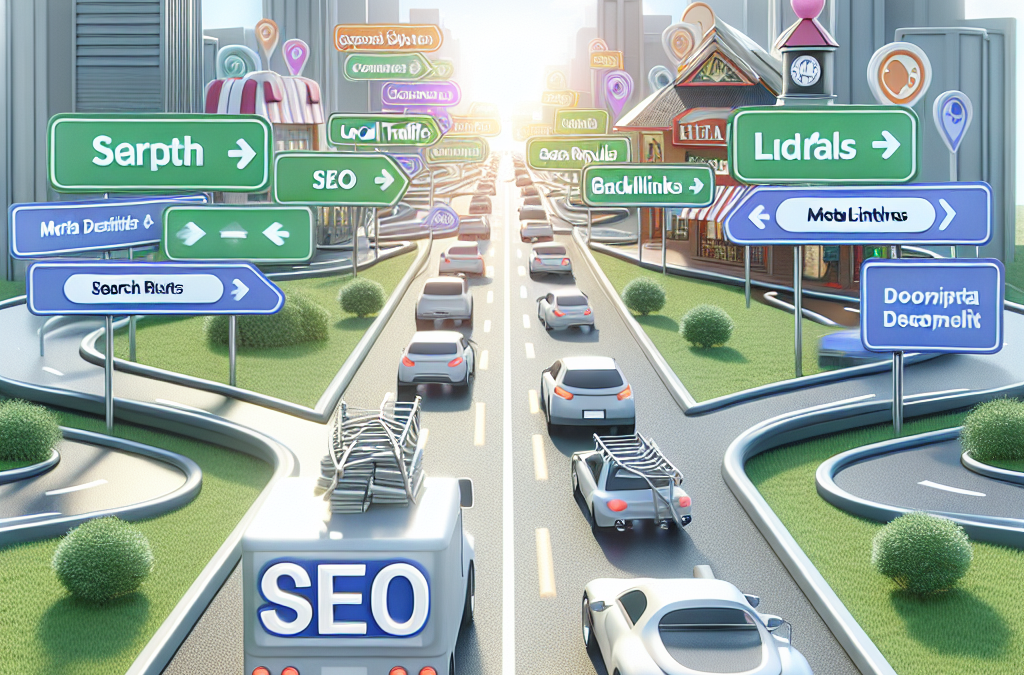Hey there! So, you want to drive local traffic to your business? You’ve come to the right place! I’ve been in the game for a while, and I can tell you that leveraging SEO techniques isn’t just rocket science; it’s an art that everybody can learn. Let’s dive in and break down this essential strategy into five major areas that can truly transform your local presence.
Understanding Local SEO Basics
What is Local SEO?
Alright, first things first. What the heck is local SEO? Simply put, it’s about optimizing your online presence so that people can find you when they search for local services or products. Imagine this scenario: someone in your neighborhood types “best pizza near me” into Google. If you nail your local SEO, your business shows up! Boom!
It’s all about making sure search engines—and folks looking for your awesome offerings—know who you are and where you are. Google has tons of relevance signals, and it’s our job to sprinkle those throughout our website and online profiles.
Think of local SEO as a digital roadmap that leads potential customers straight to your door. It involves optimizing for location-based keywords, creating location-specific content, and more. It’s crucial to get this down if you want to drive local traffic effectively.
The Importance of Google My Business
Now, have you heard of Google My Business? It’s the cornerstone of local SEO if you ask me. Setting up and optimizing your listing is like planting a flag with your business name on it. It’s your digital storefront on Google!
When you create a Google My Business account, it lets you manage how your business appears on Google Search and Maps. You can add photos, hours of operation, and respond to reviews—all of which not only helps your SEO but also builds trust with your customers.
If you’re not claiming your listing and keeping it up-to-date, you’re basically letting potential customers walk right past your store thinking you’re closed or don’t exist. So, make Google My Business your best buddy; it’s a game-changer!
Finding the Right Keywords
So, now we need to talk about keywords. Not just any keywords, though—local keywords. This means you want to focus on terms that people in your area are actually typing into Google.
I usually start by brainstorming what potential customers might search for. Tools like Google Keyword Planner can help you find these local gems. Look for terms that are popular in your area. You want to find a balance between competition and search volume.
Once you have your list of local keywords, it’s time to sprinkle them across your website. Use them in your titles, headings, and content. Just remember, don’t overdo it! Google is smart, and you don’t want to come off as spammy.
Optimizing Your Website for Local Traffic
On-Page SEO Techniques
Alright, let’s get technical for a moment. On-page SEO is about making sure each page on your website is optimized for both users and search engines. You want to match the content of your page to the searches people are doing without turning things into a hot mess.
Make sure your site is mobile-friendly. Think about it—most folks are searching for local services on their phones, right? A slow or clunky website can cost you customers. You’ll want a snappy layout, easy navigation, and fast loading times.
Also, remember to include your local keywords naturally in your meta descriptions, headers, and content. This signals to Google and your customers exactly what you’re offering and where you’re based. Your site is your billboard; make it count!
Creating Local Content
Content is king, they say, and I couldn’t agree more. But what about local content? This is where you can shine by creating blog posts, guides, and offers that speak directly to your local audience.
For instance, if you own a pizza joint, consider writing about the best food festivals in town or a guide to the best pizza toppings. This not only drives traffic to your site but shows that you’re engaged with the local community.
Don’t be shy about harnessing user-generated content, too! Encourage your customers to share their experiences and tag your business on social media. It’s an authentic way to raise visibility.
Building Local Backlinks
Backlinks are like votes for your website; the more you have from other local sites, the better the chances of climbing those Google rankings. Start networking with local businesses and see if you can guest post on each other’s blogs or collaborate in some way.
Look for sponsorship opportunities with local events, too. This can earn you valuable mentions and backlinks. Plus, it gets your name out there in the community!
It’s crucial to ensure these backlinks come from relevant, trustworthy sources. A few quality links can do wonders for your local SEO. So get out there and start building those relationships!
Utilizing Social Media for Local Reach
Choosing the Right Platforms
When it comes to social media, it’s all about quality over quantity. Pick the platforms that your local audience uses the most—whether it’s Facebook, Instagram, or TikTok—and get active on those channels.
Don’t just promote your services; engage with the community! Share local news, highlight community events, and collaborate with other local businesses. This not only builds your visibility but also creates a loyal following.
Use local hashtags and geo-tags in your posts so that people can easily find you. It’s like putting up a signpost for all to see! You want to be part of local conversations online.
Engagement with Your Community
Social media is a two-way street, my friends! Be sure to engage with your followers by responding to comments, messages, and reviews. It shows you care about their thoughts and builds trust.
Run contests or giveaways that encourage people to share your posts and tag friends. It’s an effective way to expand your reach rapidly and get people excited about your business!
And don’t forget to showcase customer testimonials and success stories. These types of posts can create a strong connection with potential customers. They want to know that you’re reliable, right?
Advertising Locally
Paid advertising can also boost your local traffic significantly. Platforms like Facebook and Google Ads allow you to target specific demographics or geographic areas, making it super easy to reach potential customers right in your neighborhood.
Creating targeted ads with local keywords and showcasing offers can draw in more local traffic to your business. It’s about getting in front of the right eyes when they’re looking for services like yours.
Be sure to track your ad performance, too. This will help you identify what’s working and what needs tweaking. There’s nothing worse than pouring money into ads that don’t convert!
Monitoring Analytics and Making Adjustments
Understanding Your Traffic Sources
Once your local traffic starts rolling in, it’s vital to understand where it’s coming from. Google Analytics can be your best friend here. It lets you track how visitors find and interact with your site, helping you refine your strategies.
Check which pages are getting the most views and see what search terms brought people to your site. This can give you a clearer idea of what’s resonating with your audience and what needs a little more love.
Don’t forget to pay attention to the bounce rate! If folks are landing on your page and leaving quickly, it might be time to revamp that content or your approach. You want them to stick around and learn more about you!
Adjusting Your Strategies
Just because something worked yesterday doesn’t mean it’ll work tomorrow. The digital landscape is always shifting, so you need to be adjustable. Regularly re-evaluate your strategies based on performance; adapt and refine as you go.
Try new keyword strategies or experiment with different types of content every other month. This keeps your approach fresh and relevant. Plus, it gives your audience something new to engage with!
Engage with the feedback you receive from your audience too. If they’re asking about certain services or complaining about something, listen! There’s always a chance to improve based on their needs.
Setting New Goals
As you monitor your progress, set tangible goals for your local traffic. This could mean increasing website visits, boosting conversion rates, or driving more foot traffic to your business. Whatever it is, having clear objectives keeps things focused.
These goals should be SMART—specific, measurable, achievable, relevant, and time-bound. Having clear markers helps you stay on track and keeps your motivation high!
And remember, it’s not just about the numbers. Celebrate the wins, no matter how big or small, because each step forward is progress in your local SEO journey.
Conclusion
And there you have it! Driving local traffic using SEO techniques isn’t as complicated as it seems once you break it down. By understanding the basics of local SEO, optimizing your website, utilizing social media, and regularly monitoring your analytics, you’re on your way to seeing a serious boost in your local presence.
Just remember, the key is consistency. Keep refining your strategies, stay engaged with your community, and watch your local traffic grow. Happy optimizing!
FAQs
1. What is the most important factor in local SEO?
The most crucial factor is ensuring that your Google My Business listing is claimed and optimized. It helps you appear in local searches and provides essential information to potential customers.
2. How long does it take to see results from local SEO?
Typically, it can take a few months to see significant results. SEO is a long-term strategy, and consistency is key to gradually improving your rankings and traffic.
3. Do I need to be active on all social media platforms?
Nope! Focus on the platforms that your target audience uses most. Quality engagement on a couple of platforms can often be more effective than being active everywhere.
4. How do I find local keywords for my business?
Start by brainstorming terms related to your business and use tools like Google Keyword Planner to find popular searches in your area. Also, look at what competitors are using!
5. Can I do local SEO on my own, or should I hire an expert?
It’s definitely possible to do it yourself, especially with the resources available online. However, if you’re feeling overwhelmed or don’t have the time, hiring an expert can provide valuable assistance and insights.


